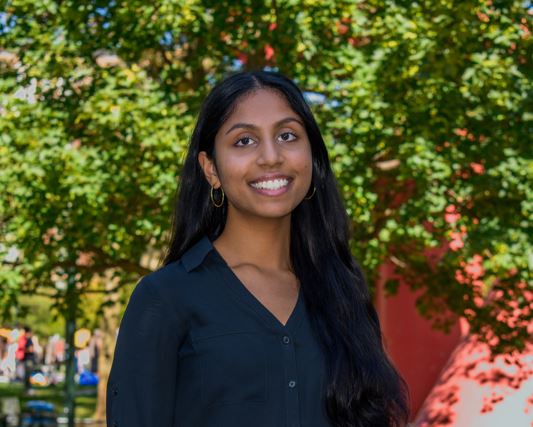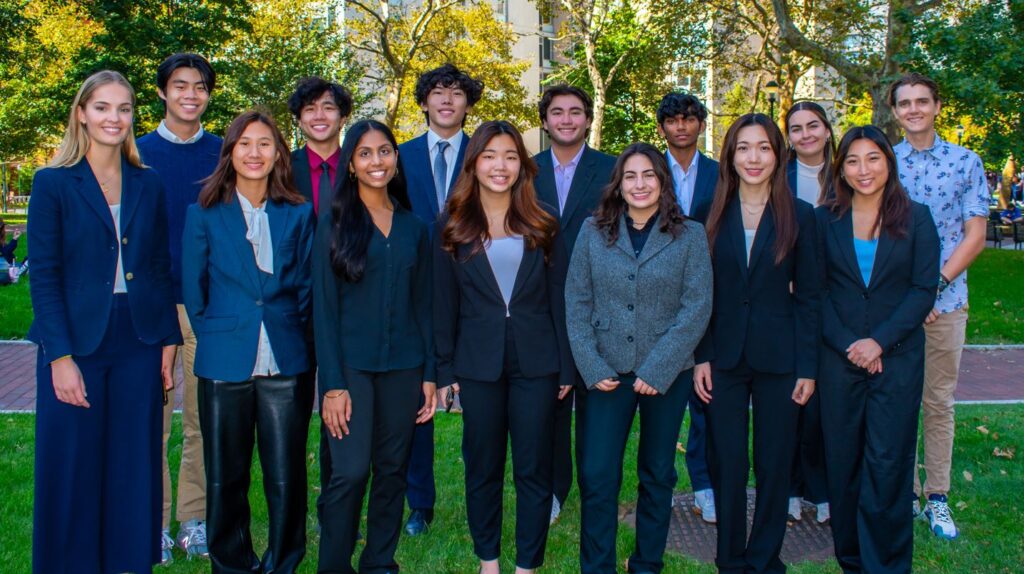
As a computer science major at Penn Engineering, Mahika Calyanakoti ’26 enjoyed her courses in data science, math, and machine learning. So when she decided to pursue an accelerated master’s degree, she chose Penn Engineering’s data science program.
Originally published in
Penn Engineering
August 13, 2024
“A lot of computer science undergrads go into the accelerated program in computer science, but I wanted a little more variety in my studies,” she says. “While the CIS master’s is a great program, I felt the Data Science master’s better suited my desire to broaden my academic horizons.”
Penn Engineering’s accelerated master’s program enables Penn undergraduates to get an early start on a master’s degree by taking graduate courses while still working on their bachelor’s. As a result, they can earn two degrees in just four years, saving time and costs.
For Calyanakoti, the decision to stay at Penn for her graduate degree was an easy one. “I wanted to take advantage of the accelerated option that Penn offers,” she says.
“It’s definitely unique to Penn. And I really like the interdisciplinary nature of Penn Engineering. We’re on the cutting edge of a lot of new technologies — for example, the school recently introduced a new AI major. I wanted to be at a place like that for my master’s as well as my bachelor’s.”

Penn Engineering Student Activities Council Board Members
An academic powerhouse
Calyanakoti says her academic experience at Penn has lived up to her expectations and then some. Among her favorite classes so far is Market and Social Systems on the Internet, a course taught by Swapneel Sheth.
“The class talked about a wide range of things, from HTTP requests and game theory to how the internet works and how different systems work all around us,” she says. “We did a lot of fulfilling projects — for example, we built a Wikipedia web scraper to answer questions about the Oscars. He took something that’s fun and made it a learning experience.”
Calyanakoti points to Erik Waingarten, who teaches algorithms, as another outstanding teacher. “He has a really positive mindset, which draws students in,” she notes. “Also, he never just gives you the answer. He’ll hand you the chalk, and you’re the one writing on the board and walking through the problem.”
A supportive environment
For Calyanakoti, another important aspect of the Penn experience has been the support she’s received from professors, classmates, and mentors.
Students play games during the 2024 ESAC Engineering formal at Dave & Buster’s.
The mentoring program connects students via PeopleGrove, Penn’s career access network for students and alumni. Operating as a Penn-specific version of LinkedIn, the platform takes a personal approach to networking, allowing participants to include details about their personal interests, hobbies and motivations.
“I like the personal aspect of PeopleGrove,” Calyanakoti says. “It can tell you what you have in common with someone else, and it tells you what motivates someone. That definitely adds a vibrant, personal touch.”
Calyanakoti has also taken advantage of Penn’s robust alumni database to make professional connections with people from a wide range of companies.
“I’ve been talking to people at companies that I would love to work at,” she says. “And those mentors have also been really influential for me.”
At the same time, Calyanakoti emphasizes that the Penn network extends beyond students and alumni to the faculty.
“It might feel intimidating to go talk to your professors, but they’ve worked with thousands of students throughout their career, so they have some of the best advice,” she says. “And they’re doing a lot of different projects, so they can also provide you with opportunities to explore your interests even more.”
A promising future

Calyanakoti performs at the Penn Raas Dance Team show.
“A lot of trading strategies and investment strategies are driven by different algorithms and quantitative methods,” she says. “That’s most intriguing for me right now. But I would love to explore all the different opportunities at Penn and find something that’s really meaningful and fulfilling for me.”
In the meantime, she encourages future students to make the most of their time in college. “We only have four years at Penn, which feels like a very short time,” she notes. “So make the best use of that time, whether that means a double major or an accelerated master’s or just talking to senior students and alumni. They’re always willing to talk and always willing to help.”
AUTHORS
